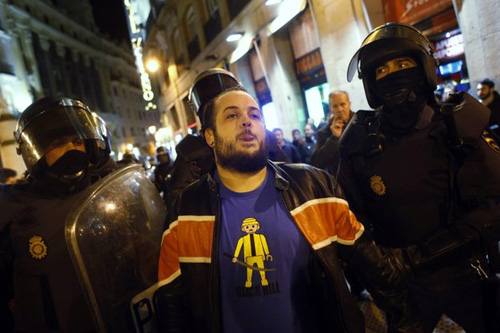
‘Glimmers of hope in Spain, which has adjusted its economy (cut labour costs)…’ wrote Financial Times blogger Dan McCrum on 28 January. ‘There are better returns coming, the conversation is turning to profits…’ Contained in McCrum’s parentheses is an entire ocean of social conflict and misery, as capital seeks to restore its profits at the expense of vast swathes of the population.
Burgos, in the northern Castile region of Spain, is a traditionally conservative, Catholic region. Out of a population of only 180,000 people, 18,000 mainly young people are unemployed; thousands are forced to migrate every year to the larger cities; hundreds of impoverished residents survive on Red Cross food hand outs. The local authority, controlled by the ruling right-wing Popular Party (PP), is over 150 million euros in debt, slashing social services and recently closing a municipal nursery to save just 13,000 euros.
In the context of this crisis – echoed throughout Spain – the residents of the resolutely working class neighbourhood of Gamonal have for months been demonstrating and petitioning against a proposed redevelopment of the area’s main street. While ordinary citizens suffered, the local council planned to transform Calle Victoria into a gentrified, tree-lined boulevard at the exorbitant cost of anywhere between 8.5 and 13 million euros. Vital free parking organised by the community was to be replaced with a private underground car park, with units costing 19,800 euros on a 40-year lease; lanes reduced from four to two and fifteen months of unwanted disruption. The main beneficiary of the construction was the notorious developer Michel Mendez Poso, known simply as El Jefe (The Boss) and owner of the region’s most influential newspaper. This is the gangster capitalism which has been the real political power behind Spain’s festering democracy.
On Friday 10 January, hundreds of local residents in Gamonal gathered to peacefully block the start of construction work. When riot police were sent in to brutally disperse the gathering, rather than retreat in the face of repression, the neighbourhood finally said enough is enough – ‘the street is ours’. Over the course of the next week, this quiet town was transformed into the site of a veritable working class uprising. Thousands took to the streets day after day, blocking construction work and diggers. Major street clashes ran through the nights, as barricades were erected, fires lit and banks destroyed. Local residents sheltered young people on the front lines. By the following Friday, over 200 police from neighbouring regions had been drafted in to occupy the town, including units from Madrid’s elite Police Intervention Unit, firing over 30 rubber bullets. In total, 46 people were arrested, six detainees jailed with bail set at 3,000 euros, dozens injured and hospitalised. Local and national media condemned and criminalised the uprising, with State Secretary for Security Francisco Martinez attempting to link the protests with ‘infiltrators’, ‘anarchists’ and violent outside agitators. In fact, all but two of those arrested were locals.
Across Spain, the uprising of Gamonal inspired mass solidarity as working class youth, the urban poor and ordinary citizens took to the streets in more than thirty cities under the slogans of ‘Solidarity with Burgos – Gamonal resists – free the detainees.’ The movement was organised outside of the trade unions or official labour parties, and consequently militancy was high. In Madrid, thousands took to the streets and clashed with police over two consecutive nights, with 14 people arrested and vicious police brutality captured on video. In Barcelona, thousands marched through the city centre on 17 January, with banks smashed, a police station seriously attacked and ‘sound cannons’ deployed for the first time to disperse protesters. The day before, striking firefighters occupied Placa Catalunya in a display of strength, their banner reading ‘If Gamonal can, we can’.
Exactly one week after the first clashes took place, the Mayor of Gamonal announced a definite halt to construction against the vote of his own party on the local council. ‘We want social peace,’ he pleaded. ‘Social circumstances’ had made continued development ‘impossible’. 10,000 took to the streets of Gamonal to celebrate and continue the movement.
The solidarity protests which lit up the country expressed a clear anti-capitalist line in support of the uprising, against police repression and in solidarity with the movements against gentrification in Hamburg and elsewhere in Europe. Those who took to the streets demonstrated a clear determination to fight. The residents of Gamonal have shown the potential not just to fight, but to win: for the working class to retake control of its streets and its cities. ‘The struggle must continue and the uprising spread to other cities in the state, and why not, the rest of the world. The discontent of these days is not only the work of the boulevard, there are many more reasons. The fight is for a decent life, for our rights, and to preserve and give meaning to the word FREEDOM.’ (Statement of the Gamonal neighbourhood assembly).
Joey Simons




